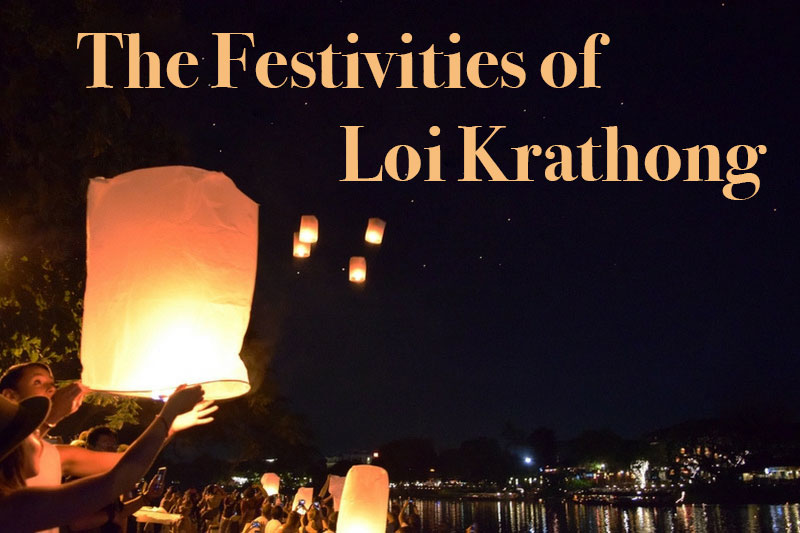
Loi Krathong
The Thai people love to celebrate and pay their respect to the country’s ancient heritage with numerous holidays and festivals. Most of them are joyous occasions with lots of dancing, singing, and feasting. Nonetheless, they all have deep ties in religion, spirituality, and culture.
Loi Krathong is not only one of the biggest and most popular festivals, it can also claim to be the most visually stunning one. If you plan your family vacation in Thailand during the month of November, then you will not be disappointed by attending these gorgeous festivities.
What Is Loi Krathong?
A rough translation of Loi Krathong means “to float a basket or boat” and, in simple terms, that is the essence of it. The Krathongs are mostly made out of bamboo leaves, bread or coconut shells. Styrofoam is an unpopular option as it is not biodegradable. In some parts of Thailand, it is – rightfully – banned. Each basket contains a candle, incense sticks, flowers, and a coin as a tribute to the water spirits. Some people even clip their fingernails or cut a lock of their hair and add it to the little make-shift boat. This tradition acts as a symbolic way of letting go of past anger and negative thoughts, and to begin with a positive mindset.
These baskets are then released into the ocean, a lake, a river, etc. as a celebration to the end of the rainy season. In a religious context, it is also a means to show gratitude towards the water Goddess Pra Mae Khongkha and to ask for forgiveness for contaminating the water. For us, it means witnessing a beautiful and unforgettable sight with thousands of candles lighting up the water as they float towards the horizon.
History of Loi Krathong
Although Loi Krathong is known as the “The Festival of Light”, the origins of it, on the other hand, are still shrouded in a fog of mystery to this day. In the early days, it was widely believed that it started in Thailand's first capital, Sukhothai, by a court lady named Nopphamat. Nowadays more people believe that it started as a Brahmanical tradition in India, which Thai Buddhists then brought over to their country. However, there is no irrefutable evidence or proof for any of these beliefs, and so it continues to be a subject of debate.
The Festivities of Loi Krathong
The date of Loi Krathong falls on the evening of the full moon of the 12th month according to the lunar cycle, which, in most cases, is in November. For example, this year (2018) it is the 23rd of November. However, it wouldn't be a proper Thai festival without countless festivities leading up to it. In bigger cities like Bangkok or Chiang Mai the festival lasts three days and in Sukhothai even five! These days are filled with beauty pageants, song and dance contests, fireworks, parades, demonstrations of ancient arts and crafts, and, of course, more food than you can fill your belly with. Chiang Mai is particularly appealing since it celebrates both Loi Krathong and the regional Yi Peng Festival on the same day. The latter is similar to Loi Krathong, only here people release floating lanterns into the sky as a way to pay their respects to the Buddha. So, in a way, both the horizon and the sky are dotted with the sight of candles in beautifully handcrafted works of art.
While the prospect of multiple days of cultural entertainment sounds great, the smaller towns of Krabi and Ao Nang have their appeal as well. If you think that hundreds of lights on a river look astonishing, then imagine what a thousand must look like out on the Andaman Sea…